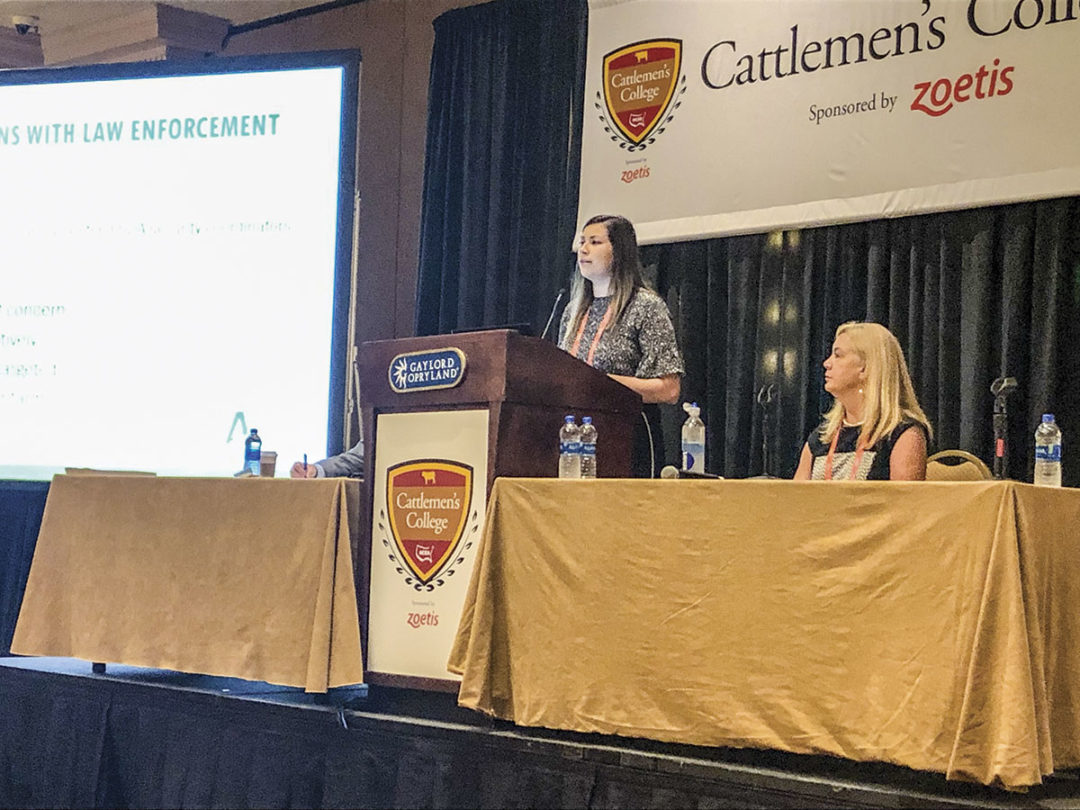Activist threats might not be at the top of every producer’s radar, but it is an issue to be aware of, said Animal Agriculture Alliance’s Emily Solis during Cattlemen’s College at this year’s National Cattlemen's Beef Association (NCBA) Convention and Tradeshow in Nashville.
While the odds of having an undercover activist or a mass protest for most producers are small, Solis reminded attendees that activism comes in many forms and can have an impact industry-wide, whether that’s through social media, legislation or infiltration tactics.
So what can producers do to deal with these activist issues? Solis said, “it’s always better to be safe than sorry.”
YouTube-proof your operation
To start off, Solis encouraged attendees to ask themselves some questions: If someone were taking a video to put on some social platform, would your farm pass the test? Is there anything you would be concerned to have spotlighted on social media? Are there any areas you could maybe improve to make it look a little better to consumers?
Solis said, “Just take a hard look at your property to see if there are any areas you could improve to reach that YouTube-proof status.”
Basic farm security measures
In terms of farm security, Solis recommended using locks on gates, fences, offices or anywhere sensitive information is housed or controversial practices are conducted. She also suggested investing in a surveillance system with proper lighting to help protect against nighttime break-ins.
“Using some sort of surveillance system helps you keep an eye on the farm when you’re not there,” Solis said. “With undercover videos especially, we have noticed animal rights activists will try to break into your farm or infiltrate your farm at nighttime, and a lot of times, employees aren’t there or anyone on the farm to keep monitoring. We’ve seen a lot of success with farmers who have implemented these surveillance systems. And in some cases, have been able to send the photos and video they have collected to us, and we have been able to identify some of the activists.”
Don’t engage protestors on the farm
While the first instinct for some producers may be to fight back, it’s important to stay calm and don’t give them anything to work with. Solis said it is common for activists to take whatever they can and spin it to fit their motive. If any suspicious activity is noticed, it should be reported to the Animal Ag Alliance and/or your local law offices.
Hiring employees
Solis emphasized the importance of getting and checking references to make sure they are really who they say they are. If something doesn’t seem right, explore it further. Procedures involving pain and/or dealing with moving sick or injured animals should be done by the most senior employees.
“We encourage you to have some sort of animal care guidelines in place, same with environmental practices and sustainability. Sustainability has been a very big thing in the media recently, and it’s something that we only continue to see grow and gain more media attention,” Solis said. “Having those practices and guidelines in place, having some type of contract that employees can sign stating they’ve read the policies, they understand the protocols in place and that they should be adhering to them – this can serve as a protection should there be any issues with animal rights activists.”
Unexpected visitors
When it comes to unexpected visitors, Solis recommended having some sort of protocol or guidelines in place and then to make sure family members and any employees know the policy. Don’t take visitors at their word. Producers shouldn’t be afraid to ask them for credentials to verify their identify and then verify those claims with proper contacts.
“You should escort visitors at all times and be cautious about information requests to make sure you aren’t sharing any sensitive information that could end up hurting you in the future,” Solis added.
Prepare for tough questions
Solis recommended producers also ask themselves: What questions would I hate being asked? And then be ready to answer those questions. Producers should be prepared to cover potentially controversial subjects such as animal welfare, antibiotic use, environmental impacts, use of GMOs, etc.
Solis outlined a few do’s and don’ts:
Do’s
- Put a human face on agriculture (don’t try to speak for the beef industry in general; talk about your personal story, your family, your farm).
- Try to relate your subject matter to something the general public has experience with.
- Think of your three key points that you want the audience to walk away with.
- Try to truly understand questions/concerns before responding.
Don’ts
- Use industry/medical/technical jargon (i.e., heifer, call her a female cow).
- Speculate. If you do not know the answers, say so and offer to help find the information or refer them to someone who can.
- Be negative toward different industries or production methods. “We’re all in this together, and we need to increase consumer trust in agriculture as a whole,” she said.
- Get drown into debates. Politely end the conversation if the discussion is turning unproductive and adversarial.
- Show or discuss sensitive topics without proper context.
Solis concluded, “We can’t let any concerns with animal rights activists, especially on social media, prevent you from telling your story. If you’re not telling your story, you are leaving it up to the animal rights activists to tell their story.”
To listen to an interview with Emily Solis on this topic, click here.








